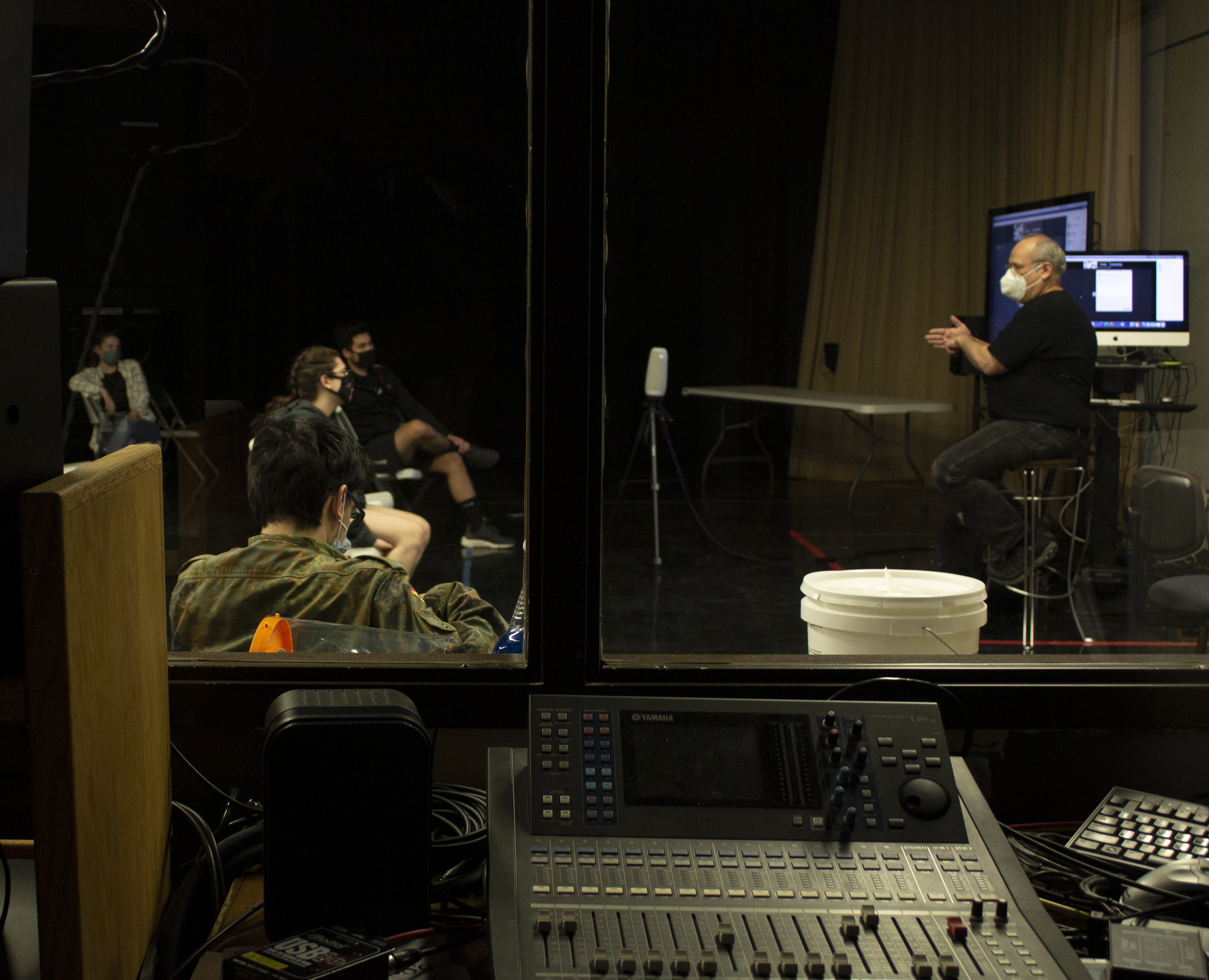![]()
Editor’s note (03/25/21): This story has been updated to include Spring 2021 admissions data.
Universities across the United States are making serious financial decisions in the wake of the coronavirus pandemic. Following recent university budget cuts, the JBU administration will close the communication department in May 2022.
Jake Stratman, dean of the College of Bible, Humanities and Arts, made the announcement to students in the communication department on March 1. Shocked and angry, students questioned him on aspects of the budget, the viability of communication organizations without the department existing and the futures of underclassmen. Later that night, The Threefold Advocate released an editorial responding to the decision.
On March 2, the university announced the decision to faculty and staff in a town-hall meeting led by University President Chip Pollard. The administration also released a statement describing the rationale behind the decision, citing “important economic factors in creating, changing or ending programs as JBU strives to keep tuition as low as possible while balancing our operating budget.” The most concerning indication for the program’s viability was the student-faculty ratio, which “continue[s] to rank at the bottom of all of our majors — well below what is financially sustainable,” according to the statement.
A lack of communication
Johnathan Cleghorn and Rachel Ball, both senior communication majors, said that they felt blindsided by the announcement and how it was made. “[Stratman] had to stand there, and he had to answer very pointed questions that he didn’t have the answers to because he did not make the decision,” Ball said. “It felt like the decision-makers were hiding from us because they knew the decision was wrong.”
For a decision directly impacting students, Cleghorn said he felt shut out of the conversation. “I think they took in a lot to consider. They had good intentions. I do wish we could’ve made an appeal for the major before the final decision was made,” Cleghorn said. “That way, the students could really articulate what the major means to them.”
Ball also described how students handled communicating the news as compared with the university. “[The administration] made the unfortunate mistake of telling a room of student journalists … Thus, they were not prepared for any publicity until maybe after the faculty meeting on Tuesday,” Ball said. “So then when we broke the news Monday night and the internet exploded, they just simply were not prepared to deal with alumni because not even their own faculty members knew yet.”
However, both students said the decision did not surprise them. Ball “very quickly realized that JBU was allowing our department to be sort of crushed as other departments were growing.” “Don’t get me wrong … I love that we have new visual arts departments. I love that we’re recognizing those fields are growing. I love that we’re growing our engineering and computer science majors because I also think those are important, but the reality is — if JBU is pouring money and resources into those departments because they recognize those fields are changing, why are they not doing the same for communication?” Ball said.
She went on to describe the ways communication has been impacted by social media and digitalization and how she felt the university was not providing students opportunities to keep up with these changes by updating equipment and workspaces. “Instead, what I saw was that other faculty members were blatantly walking around, telling administrators that they wanted our space … That was really frustrating because it was coming from professors with buildings and buildings worth of space and [who] had thousands of dollars with which to update their equipment every year,” Ball said. “That was why I felt completely unsurprised … because I saw JBU’s apathy in terms of updating this department and defending it, and I knew subconsciously what that spelled for our fate as a department.”
Deciding on the cut
Ed Ericson, vice president for academic affairs and member of the presidential cabinet, described how the decision had been a decade’s long process. “There’s been a huge shift in the world in how people consume information, and so we’d been having conversations with Dr. Smith and others obviously for a long time about ‘what does that look like’, and ‘how do we change things?’” Ericson said. “My point in saying it’s been a 10-year process is that this wasn’t a decision that was reached in the last month. This is the conversation that’s been going on for at least a decade.”
By introducing the integrated marketing communication (IMC) major next year, the university seeks to establish a program in a growing field where the market is headed. “We’ve got a lot of business people on the Board [of Trustees], and they say, ‘Well, what we really want for our smaller businesses or larger, we want a person who can come in and do all of these things,’” Ericson said. “It seems like what the business world is asking from us, we haven’t offered as a unified degree program.”
The decisions to cut the program and to not fill the communication department’s empty department head position went through a multi-step process from September to March, focusing on the university’s budget and mission. First, it begins with “the various departments in the [College of Bible, Humanities, and Arts], and those would go up through Dr. Stratman, who is the college dean [and] will bring it to the Dean’s Council,” Ericson said. “The Dean’s Council then prioritizes all the positions, and we have a conversation and debate about why we think this position or this program is more important or less important than others.”
The list of priorities that the council decides on is then sent to the presidential cabinet, comprised of university vice presidents and executive directors. “We’ll have conversations on those things that are kind of at the margins … you’re not just comparing it to things within the academic area but things across the institution,” Ericson said.
Employment also has been impacted by other difficult decisions that the university has made regarding finances. According to the Arkansas Democrat-Gazette, the university announced the layoffs of “12 employees — including staff members, professors and administrators” in March 2020.
Ericson affirmed that decision to cut the communication program was not a reflection of the work of Debbie Miller, assistant professor of communication, Darren Gould, instructor of communication, or Marquita Smith, former department head of communication. “They’ve been essentially trying to run uphill … Our newspaper continues to win awards, just as one example,” Ericson said.
Looking at the trends
The university’s statement presented how enrollment in the communication major declined from 55 to 27 students over the past decade.
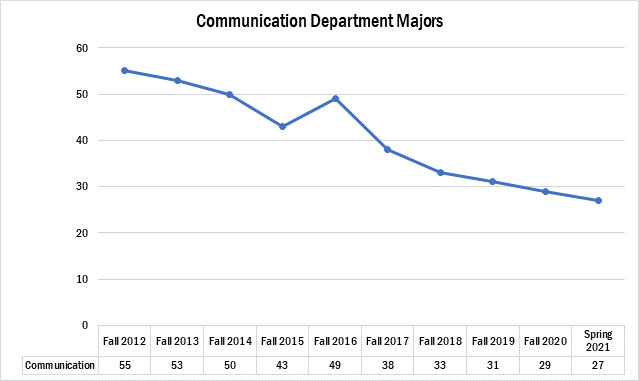
According to the Fall 2020 Preliminary Enrollment Report, overall traditional undergraduate enrollment has been on a downward trend since 2017, decreasing by 132 students. However, communication made the cut for the top 20 majors in enrollment, making it higher than 21 other programs (48.7% of all programs) offered by the university. Comparable major, English, did not make the Top 20 enrollment list.
Programs smaller than communication, according to the enrollment report, include philosophy, biblical and theological studies, math, Spanish, chemistry and political science.
Despite being a smaller program, communication has been equally or more successful in terms of retention rates and having students graduate with their original major, compared to similar majors English, English education and marketing.
The Oct. 2020 Persistence and Completion Rates by Department and Major Program report from the Institutional Research Office examines completion rates for all students “who begin as degree seeking” at JBU, including transfers, and it examines the retention rates from the first to third semesters, the time where JBU loses the most students. The percentages of students who were in the English department their fourth semester and later graduated with their original major were the same or lower than communication from 2011 to 2017. English also had 63% of students staying in the department in their third semester in the 2019-2020 academic year, the same percentage as communication.
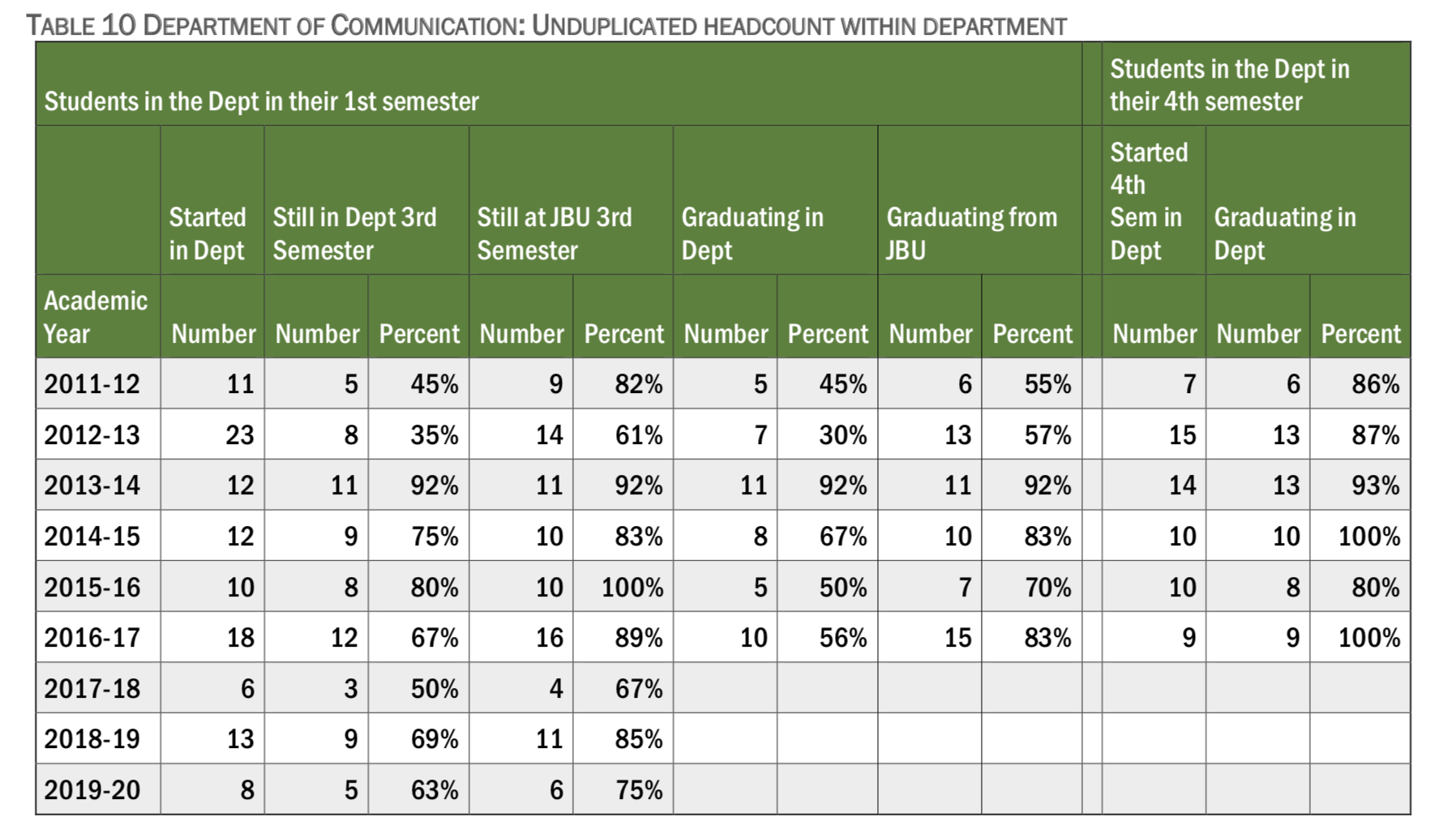
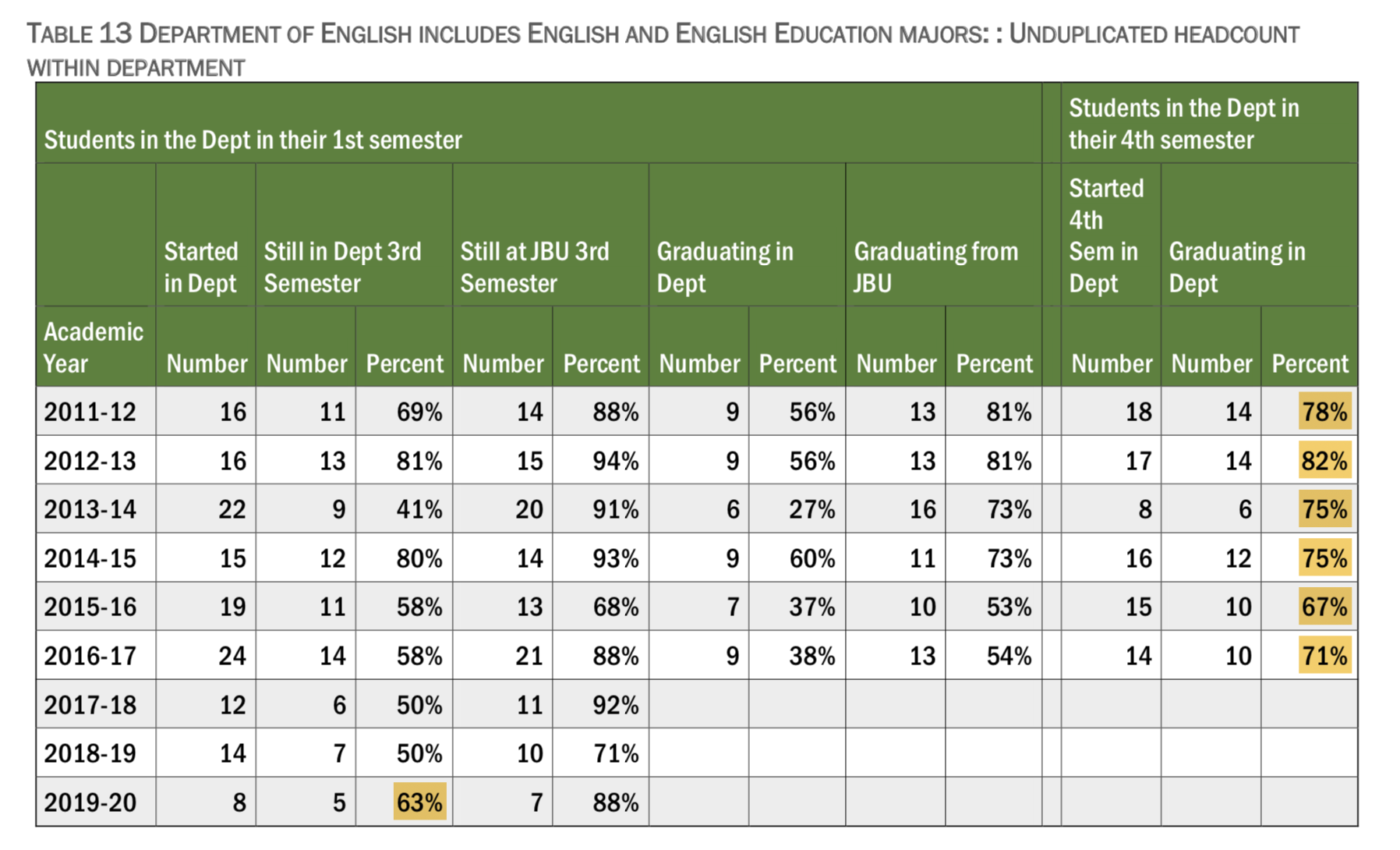
When compared to the communication department, the marketing major—housed in the business department—had the same or lower percentage of students during 2011 through 2017 who were in the major for their fourth semester and later graduated with it as their original major in all years except for the 2015-2016 academic year. Marketing also had 56% of students staying with the major in their third semester in the 2019-2020 academic year, compared with 63% of students in the communication department.
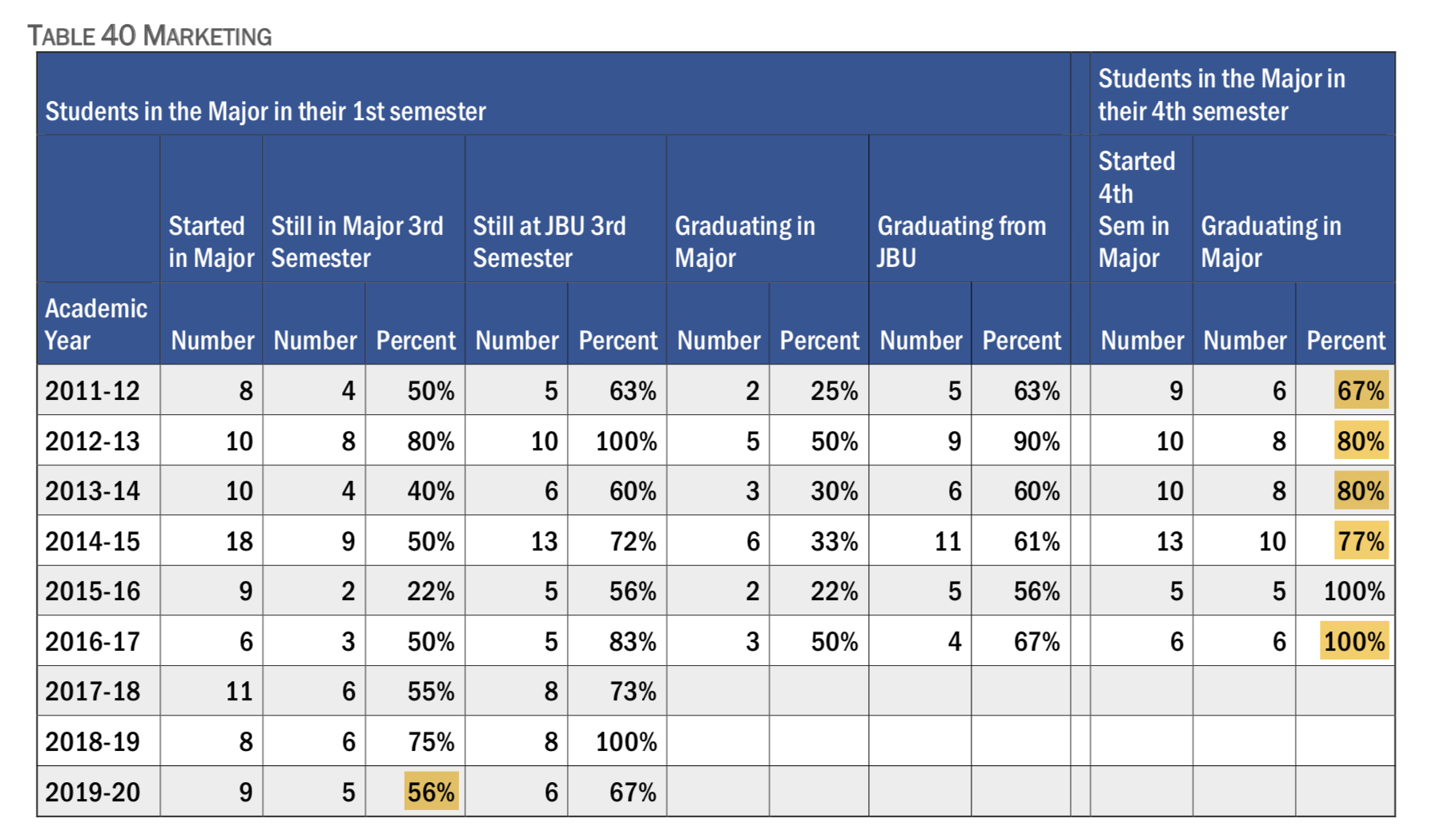
While the administration has encouraged freshman and sophomore communication students to switch to the new integrated marketing communications major or English, the communication major has lost more students over the past decade to family and human services, photography or intercultural studies (12) than to English or marketing combined (2), according to the report.
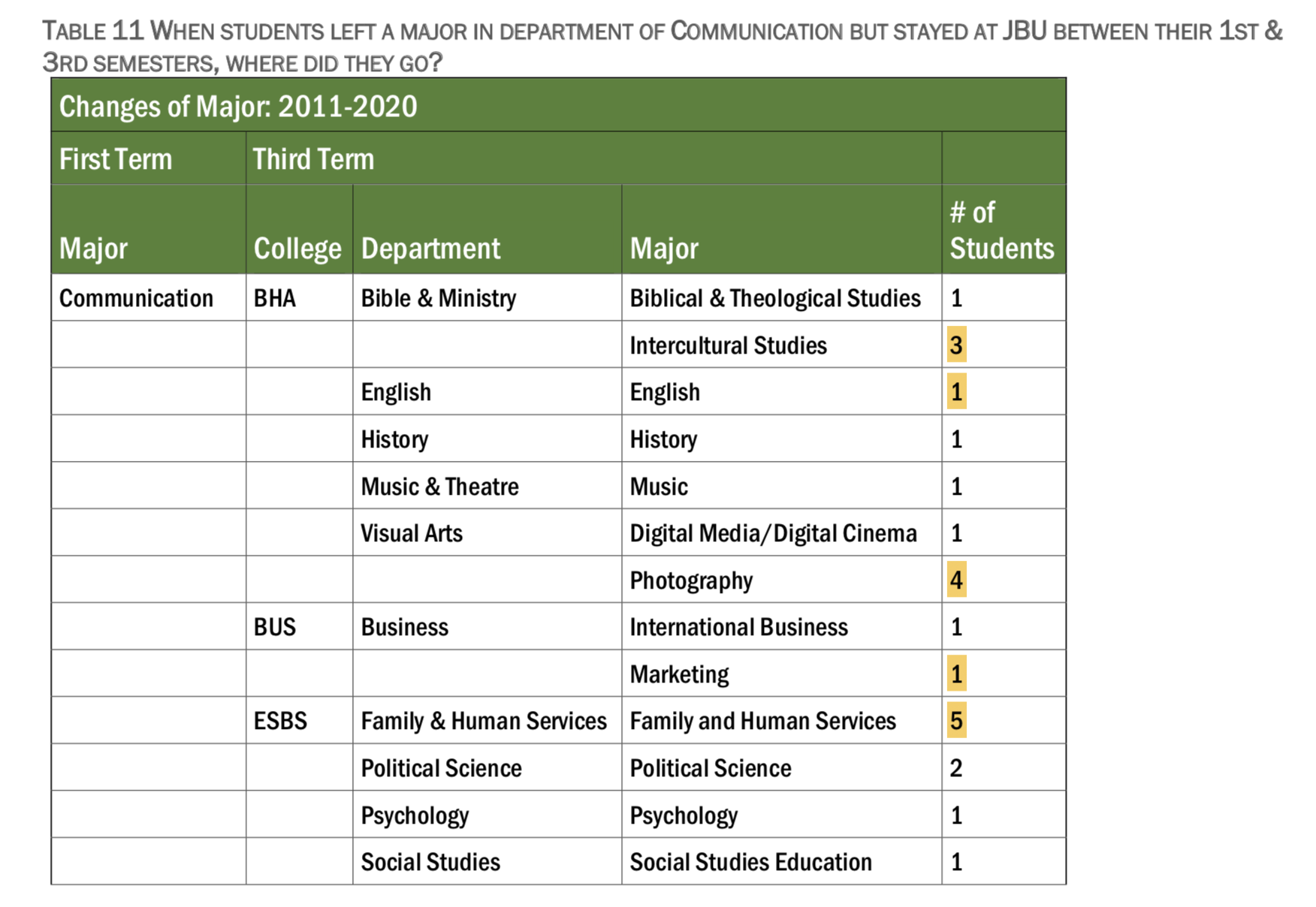
Although the enrollment numbers for communication consistently decreased from Fall 2016 to Spring 2021, the department stood to benefit from the university’s record admissions numbers for the upcoming academic year. As of March 18, communication is the second highest major to receive applications in the College of of Bible, Humanities and Arts, according to the JBU Admissions Office.
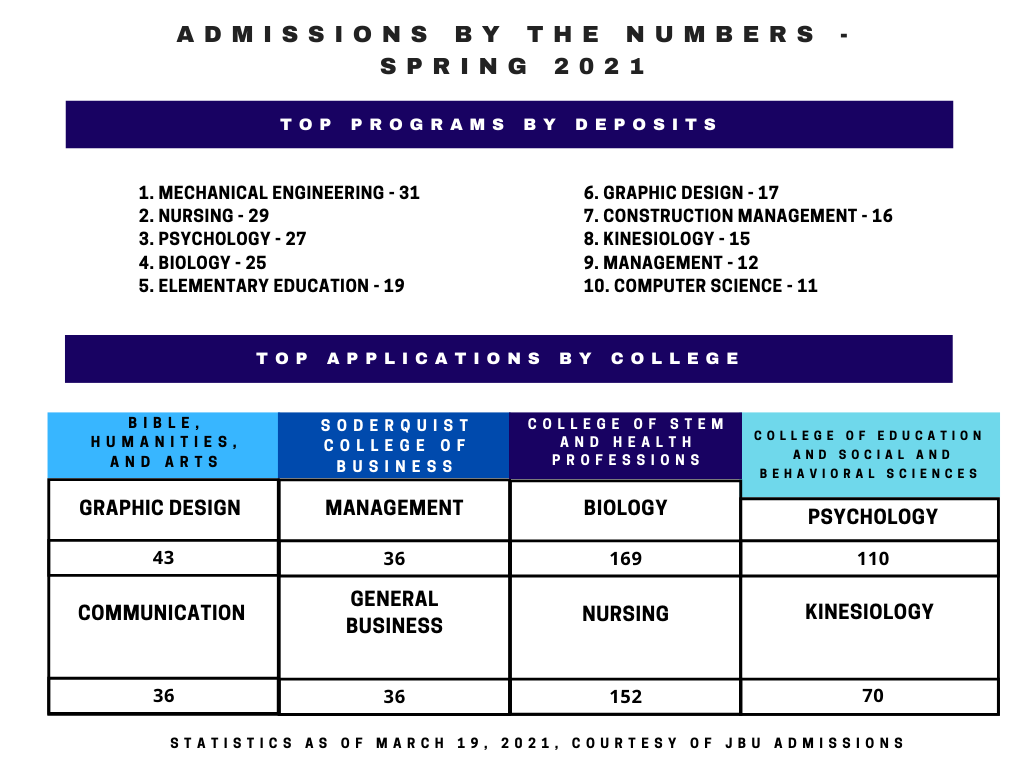
Response to the news
When The Threefold Advocate broke the news of the department closure on March 1, current students, parents, alumni and community members reacted on social media.
Samantha Bower, who graduated from JBU in 2018 with a degree in communication, shared the announcement with her LinkedIn network. “I am now two years into my current job heading up communications and public relations for a local hospital and putting into practice all of the different facets of communication that I learned at JBU,” Bower posted. “I am disappointed to learn other future students will not have the same curriculum opportunities and experiences that led me to where I am now.”
In response to the editorial, Ball has heard many students express fear about their own majors. “Students are scared that their department is next because there are a lot of departments that are smaller than us, who retain fewer students than us, that feel like their necks are on the chopping block going forward,” Ball said. “Students are terrified because their interests have been left out of the conversation. They feel like they are dollar signs being pushed around in some giant Excel spreadsheet in some big upper-level office somewhere with no consideration as to their interests and their passions.”
When Ashley Harrison, senior communication and Spanish double-major at Ouachita Baptist University in Arkadelphia, Arkansas, heard about the announcement and how it was shared with students at JBU, she was shocked. “If this is an example of how communication works there, I can understand why it’s not working at all. The basis of communication is speaking and giving each other vital information like this.”
Harrison argued that students should have been a part of the conversation. “I feel like one of the best times when a college can adapt for its students is when it listens to them, and not only that, but is willing to work with them … A lot of us are getting to the point … [of] being problem-solving adults that are willing to work with other problem-solving adults and face situations like this one,” Harrison said.
The future for students
Soon after the announcement was made, communication students reached out to local news stations. Both KNWA/FOX 24 and the Northwest Arkansas Democrat-Gazette reported on the decision and response of the larger community.
Julie Gumm, director of University Marketing & Communications, stated that KNWA/FOX 24 incorrectly reported that journalism classes will not be offered at higher than a sophomore level. Gumm stated that the university will “work with the freshmen and sophomores so that any communication classes they take will count toward the journalism minor that starts in Fall 2022, even if the courses do not continue to be offered as part of the minor.”
Ericson also stated that the university will work with affected students through individual advising. “Some of them may be able to get through the vast bulk of their degree but have to do it by switching around when they take some of their courses, and then maybe there’s some independent studies that they take to finish up,” Ericson said. “Some of them may move over to the IMC … So yes, there’s a goal of trying to teach out all the students, but that will have to be done on a case-by-case basis.”
In terms of how this decision will impact the department’s spaces and student organizations, Ericson said that the university wants to keep both. “They’ll probably get changed in some format, but from a cabinet perspective, we’re too far away from those things to say what should be done. We’ve asked the people closer to come up with plans,” Ericson said.
Ericson referenced the Catholic principle of subsidiarity in describing how the university plans to make these decisions. “You want to allow the people closest to the decisions to make it. In fact, if you take the decisions away from them, you are sinning.”
Current students are alarmed about how these changes will impact the future of the newspaper, yearbook and Golden Eagle Productions (GEP). Ball, who serves as the president of GEP, is especially concerned. “Both The Threefold Advocate and Golden Eagle Productions will suffer in terms of student membership numbers because there are no longer students who love those things who are being served by this school anymore … When you no longer have students to fill those organizations, those organizations die,” Ball said.
Photo: María Aguilar/ The Threefold Advocate

